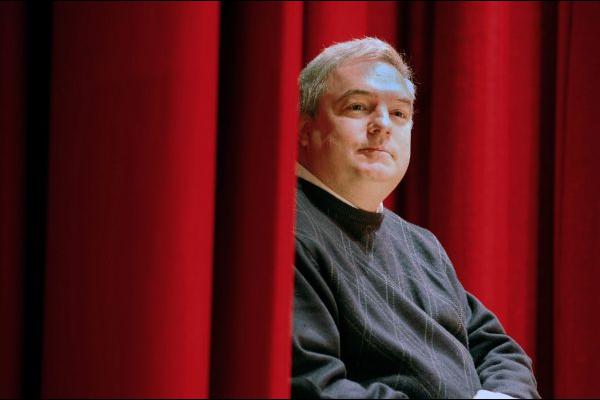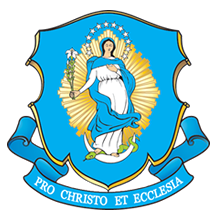
Dr. Robert Stackpole, STD, whose Q&A column is one of the most popular features on the Marians' website, thedivinemercy.org, has written a new book.
Divine Mercy: A Guide from Genesis to Benedict XVI was published this month by Marian Press.
In the 260-page book, Dr. Stackpole, the director of the Marians' John Paul II Institute of Divine Mercy, explores God's mercy throughout salvation history - from the Old and New Testaments, the writings of the Church's great theologians, and the lives and writings of the saints, up to the Divine Mercy movement as we know it today.
How did the book come about? Why is its timing so crucial? We posed these questions, and more, to the author this week, and here's what he had to say:
Robert, tell us what your purpose was for writing this book.
My friend and fellow Divine Mercy devotee Fr. George Kosicki, CSB, once said that The Divine Mercy devotion is not so much about our devotion to God but rather, primarily, about His devotion to us. God's amazing, merciful love for us has been proclaimed in the Bible, written about by the greatest saints of the Church, and pondered by popes leading up to our current Pontiff Benedict XVI. With this book, I really wanted to show that the message of Divine Mercy is something that the Church has been unfolding and developing from age to age, deepening our understanding and appreciation of this central mystery of our faith. We are now the beneficiaries of all these centuries of reflection by popes, scholars, and saints alike.
So how did this book come about?
The book came out of college lectures I did over the years, beginning with a course on Divine Mercy that I taught at the Dominican House of Studies in Washington, D.C. Most of the students were Marian seminarians. As part of that course, I researched more in depth the theology of Divine Mercy and certain saints who have spoken about Divine Mercy. Then, I taught a broader course called "Catholic Theology and the Love of God" here at Redeemer Pacific College, outside of Vancouver, B.C., where I live.
At some point, then, I assume you began to realize that Divine Mercy wasn't just an important theme in Catholic theology that needs to be recovered and appreciated; it is actually the important theme in Catholic theology.
Yes. It became clear to me that this theme of the merciful love of God is something that actually could tie the whole Catholic faith together. This is something Fr. Michael Sopocko [St. Faustina's confessor] saw long ago. He wrote a big, four-volume study on the theme of mercy, covering basically every aspect of Catholic theology. So I had his example to begin with and drew upon it. Then, in teaching these themes and interacting with the students, I realized this wasn't just academic theory. Mercy really is the central theme for understanding scripture and the great teachings of the great theologians such as Aquinas and Augustine.
In addition to St. Augustine, St. Thomas Aquinas, and, of course, St. Faustina, you include chapters on St. Catherine of Siena and St. Francis of Assisi, to name a few. Why did you choose to focus on these saints?
They are the ones who really emphasized the message of God's merciful love. But also, I wanted to show that the message of Divine Mercy has permeated every age and many nations and cultures. It is our common Catholic inheritance, not just an idiosyncrasy of Poland or of St. Faustina.
Along those lines, what is the biggest misunderstanding some people have about Divine Mercy?
Some people think, "Oh, Divine Mercy. That means you have a special devotion to St. Faustina." Well, you could be devoted to Divine Mercy and have no devotion to St. Faustina. She's just one of a long stream of great saints who focused their lives on the merciful love of God.
Having said that, what makes St. Faustina and her Diary stand out?
A couple things. The first is that she draws together a lot of the threads in the Catholic spirituality of Divine Mercy. You can find in her Diary her devotion to the Heart of Jesus. You can find the way of spiritual childhood that we also see in St. Therese, the "Little Flower." You can find in her Ignatian meditation on the life of Christ. It's incredible how she synthesizes Catholic spirituality - almost everything that's come before. Another thing is that through the things that were revealed to her, like the image of The Divine Mercy, the Feast of Mercy, and the Chaplet of The Divine Mercy, she has given the world an expression of Divine Mercy, a way of Divine Mercy touching our hearts in a way that seems to be really well suited to our times and really enables people to understand it and appreciate it.
Who would you say is the audience for this book?
Though it can be happily read by anybody, individually, I was really hoping it would be useful for groups who want to study together the message of mercy. Primarily people who are involved in Divine Mercy groups or parish groups that want to explore Divine Mercy. The book is arranged so that it can be used for group discussion. I can see it being a great tool, say, for a parish group wishing to dig into Divine Mercy for Lent, or a Eucharistic Apostles of The Divine Mercy cenacle that has already gone through the formation manuals and then wanted to dig into things in a different way.
Father Seraphim Michalenko, MIC, has said that the book is ideal reading as we prepare for the World Apostolic Congress on Mercy this April.
Yes. I see it as both preparation and follow up.
Speaking of the Congress, as one of the leading experts in the message of Divine Mercy, what do you think is the significance of this Congress?
The Congress will be the first time that the Universal Church has gathered itself together - directly under the shepherding of the Pope and the bishops - both to study together and to celebrate this central mystery of our faith. It shows that "Divine Mercy" is not just another "private devotion." Rather, the message of Divine Mercy is alive and well at the heart of the life of the Church.
So many people speak of the timeliness of the revelations to St. Faustina in the 1930s and refer to Divine Mercy as the "message for our times." After all this research you have done, and with all of the historical perspective you have gained by it, why is Divine Mercy so important for the world at this very moment?
Pope John Paul II said it best. He identified the fact that we live in an age marked by hopelessness. These circumstances, I think, were inevitable when considering the choices western cultures have made. From the time of the French Revolution, our civilization has tried to understand the universe and solve the world's problems without reference to Jesus Christ. The so-called "Enlightenment" has led to the mess we are in now. Humanly speaking, if all we have is our own wits to draw upon, our situation is hopeless. Pope John Paul II summed up the only possible solution to it in his homily at the beatification of Sr. Faustina back in 1993:
The balance of this century, which is now ending ... presents a deep restlessness and fear of the future. Where, if not in The Divine Mercy, can the world find refuge and the light of hope? Believers understand that perfectly.
Unless we turn to The Divine Mercy, we don't have hope. He said that hope is the cure, and the basis of that hope can only be the merciful love of God. If we have to rely on our own resources, we're sunk. I think that explains best why the message is so urgent. Divine Mercy isn't going to answer every question about economics or foreign affairs, but unless you have an underlying hope, unless you're praying with trust and relying on the strength of God, mankind can't face its problems. Not only mankind in general, but we as individuals, facing the crosses of living in the modern world.
In a certain sense, I think mankind has been brought to the end of its rope, or has been allowed by God to come to the end of its rope. It has lived out, especially in the 20th century, the end result of trying to - in the words of Frank Sinatra - "do it my way." And hopefully we realize the situation is not hopeless. It's only hopeless when we rely only on ourselves.
Our hope is in the merciful love of God.
Yes, and sometimes coming to the end of your rope is not a disaster, but an opportunity, and that's what I think is happening now.
Read an excerpt from Divine Mercy: A Guide from Genesis to Benedict XVI.
















